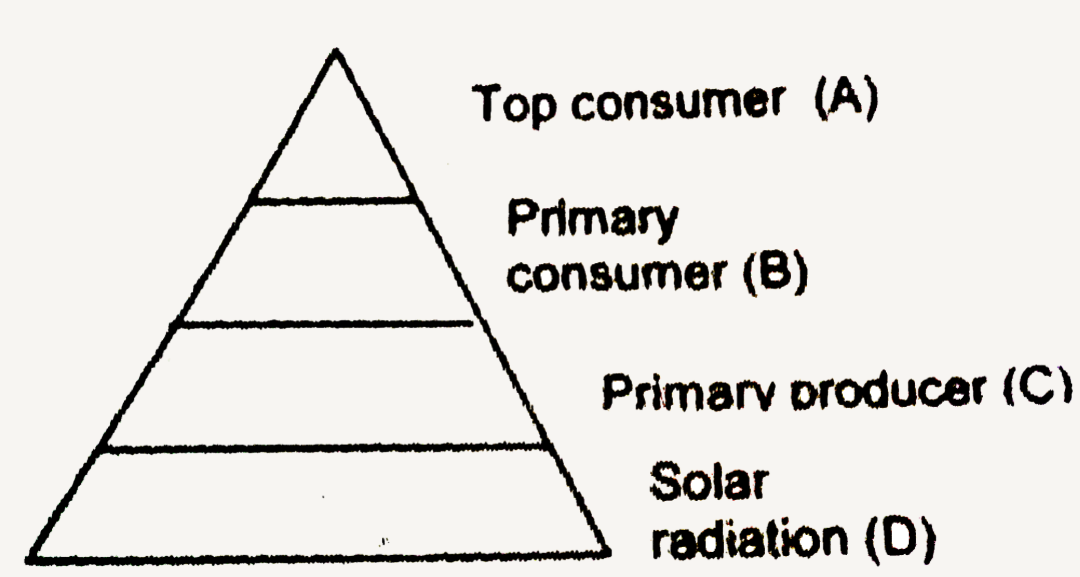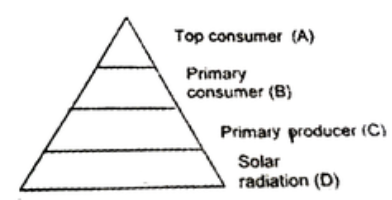Complete Solutions to MCQ of chapter ECOSYSTEM of Class 12 book with complete answers and questions
| Class 12 | BIOLOGY |
| Chapter | ECOSYSTEM |
| TRUEMAN BIOLOGY | MCQ |
| Number Of Questions | 100 |
| Academic Year | 2023-24 |
The tiny free-swimming animals on the surface of water constitue
01:06View SolutionA rat feeding on potato tuber is a
01:06View SolutionThe nature's cleaners are
01:10View SolutionTotal amount of living material at the various trophic levels of a food chain is depicted by pyramids of
01:24View SolutionThe more abundant animals in a desert and grassland are
01:03View SolutionIn a food chain, the largest population is that of
01:10View SolutionThe nature of climax community is most dependent upon
01:08View SolutionBiogeochemical cycles are also called
01:05View SolutionPlant succession occurring in a sandy area is
01:10View SolutionWhen the vegetation of a region reaches climatic climax, it usually becomes
01:03View SolutionPrimary succession on rocks starts with
01:08View SolutionFirst plants to appear on a badly burnt forest area will be
01:04View SolutionPioneer in a hydrosphere are
01:02View SolutionThe rate at which light energy is changed into chemical energy of organic molecules by the producers is
01:07View SolutionThe concept of ecological pyramids was given by
01:03View SolutionFrog that feeds on insects is a
01:02View SolutionIf by radiation all nitrogenase enzymes are inactivated, then there will be no
01:08View SolutionWhich of these belong to the category of primary consumers ?
01:04View SolutionGPP is equal to
01:07View SolutionIn ecosystem, the insectivorous plants are placed in
01:08View SolutionRound worms in the intestine of human beings are belonging to
01:02View SolutionNitrosomonas and Nitrobacter like nitrifying bacteria are members of
01:11View SolutionExample of man made terrestrial ecosystem is
01:05View SolutionOn earth, maximum amount of dry matter is synthesized by
01:02View SolutionOrganisms associated with detritus food chain are
01:04View SolutionHighly productive and shallow lakes are
01:10View SolutionPredaceous fungi belong to
01:05View SolutionParastitic angiosperms are
01:06View SolutionPrimary productivity is measured in terms of
01:03View SolutionPredators derive energy from
01:02View SolutionOsmotrophs belong to
01:07View SolutionLimnology is related to
01:04View SolutionEnergy content of the biomass is determined by using
01:04View SolutionHighest rate of primary productivity is found in
01:02View SolutionWhich one is a secondary consumer ?
01:14View SolutionA branch of ecology which is concerned with the study of individual species at all stages of its life cycle in relation to environment is called
01:04View SolutionThe study of an entire community in relation to its environment is called
01:02View SolutionBoth the zebra and African lion live in the tropical grasslands but occupy different.
02:35View SolutionCompetition for nutrients, food, light and space is more severe between two
01:05View SolutionWhich of the following ecosystem is least productive ?
01:12View SolutionWhen man eats fish, which feeds on zooplankton, which have eaten small plants, the producer in the chain is
01:14View SolutionAn ecosystem is a complex interacting system of
01:03View SolutionLargest terrestrial community of an entire geographical belt over which plant and animal species may be found is called
01:07View SolutionMajor communities of the world are
01:39View SolutionDesert can be converted into grassland by
02:13View SolutionWhich type of forest is found near equator?
01:03View SolutionWhat is plankton ?
01:06View SolutionPlants which are attached to the stones and rocks are
01:04View SolutionBiogeochemical cycling means
01:28View SolutionWhich of the following is the logical sequence of carbon cycle ?
01:12View SolutionMaximum contribution of oxgyen is got from
01:06View SolutionBurning of fossil fuels affects one of the folowing cycles in nature
01:03View SolutionAll populations in a given physical area are defined as
01:05View SolutionStratification is present in
02:16View SolutionWhich of the following utilizes inorganic materials ?
01:10View SolutionWhich of the following is an artificial ecosystem ?
01:03View SolutionFactors connected with form and behaviour of earth's surface are
02:23View SolutionIn an ecosystem bacteria are considered as
02:15View SolutionIn which ecosystem species diversity is low ?
01:06View SolutionThe term biosphere used for the zone of earth where life exists is
01:09View SolutionIn India, tropical rain forests occur in
01:03View SolutionWhat fraction of assimilated energy is used in respiration by the herbivore ?
01:04View SolutionPosition of herbivores in the pyramid of biomass is
01:10View SolutionA habitat not suitable for primary productivity is
01:03View SolutionWhich crop utilizes solar energy most efficiently ?
01:09View SolutionAn ecosystem is
01:04View SolutionOne of the following is not an example of prey-predator food chain
01:17View SolutionOne way cycle is
01:12View SolutionLiving organisms and water, air and earth collectively form
01:03View SolutionThe graphic representation of interrelationship between plants and animals is
01:11View SolutionEcosystem of a pond is
02:36View SolutionMaximum biomass of autotrophs in oceans is formed by
02:42View SolutionIn a lake, the upper warmer oxygen-rich water zone is called
02:52View SolutionThe statement ''Tiger is the apex of food chain'' indicates
01:11View SolutionWhich type of the following pyramids are never inverted ?
03:13View SolutionWhich one is an inverted pyramid ?
01:05View SolutionTreeless terrestrial biome of cold climate is
02:47View SolutionA biome is
01:08View SolutionSecond trophic level in a lake is
01:04View SolutionWhich one has maximum biomass ?
02:16View SolutionIn grass-deer-tiger food chain, grass biomass is one tonne. The tiger biomass shall be
01:12View SolutionTip of an ecological pyramid is occupied by
01:03View SolutionChoose the correct sequence
01:07View SolutionIn which habitat does the diurnal soil temperature vary most ?
01:12View SolutionWhich of the following is most stable ecosystem ?
03:30View SolutionThe great barrier reef along the east coast of Australia can be categorized as
01:05View SolutionWhat is a keystone species?
03:00View SolutionAn ecosystem which can be easily damaged but can recover after some time if damaging effect stops will be having
02:52View SolutionWhich of the following is expected to have the highest value `(gm//m^(2)//yr)` in a grassland ecosystem?
03:12View SolutionAbout 70% of total global carbon is found in
02:21View SolutionConsider the following statements concerning food chains
(i) Removal of 80% tigers from an area resulted in greatly increased growth of vegetation
(ii) Removal of most of the carnivores resulted in an increased population of deers
(iii) The length of food chains is generally limited to 3 - 4 trophic levels due to energy loss
(iv) The length of food chains may vary from 2 to 8 trophic levels
Which two of the above statements are correct?03:18View Solution'All the pyramids, of number, of energy and biomass are upright''.
(i) Grass land (ii) A big tree
(iii) A sugarcane field (iv) The Arabian Sea
Find the option which correctly tells the ecosystem (s) for which the above statement doesn't hold true.02:23View SolutionAll the following are limitations of ecological pyramids, except
01:20View SolutionFind the correct statement
01:21View SolutionConsider the following statements
In an ecosystem energy
(i) Movement is unidirectional
(ii) Is lost irretrievably
(iii) Movement is non-cyclic
(iv) Movement is from higher to lower trophic levels
Of these statements01:12View SolutionMatch list-I with list-II and select the correct answer using the codes given below the lists
`{:(,"List-I",,"List-II"),("A.","Ecotone",1.,"Running water"),("B.","Benthic",2.,"Replacement of one community by another"),("C.","Sere",3.,"Transitional zone between two communities"),("D.","Lotic",4.,"Zone found at the bottom of the sea"):}`03:06View Solution
(A) `10 kcal//m^(2)//yr`
(B) `100 kcal//m^(2)//yr`
(C ) `1,000 kcal//m^(2)//yr`
(D) `1,00,000 kcal//m^(2)//yr`
In the above energy pyramid for an ecosystem, the rate of secondary production isView Solution
(A) 10 kcal//m^(2)//yr`
(B) `100 kcal//m^(2)//yr`
(C ) `1,000 kcal//m^(2)//yr`
(D) `1,00,000 kcal//m^(2)//yr`
Refer to the above diagram of energy pyramid. The ecological efficiency at primary consumer level, in comparison to that at secondary consumer level, isView SolutionThe stratification pattern in a community is well illustrated by a
02:29View SolutionIn the absence of decomposers, ecosystem functioning is adversely affected due to
03:48View Solution
MCQ questions and complete solutions for chapter ECOSYSTEM of TRUEMAN BOOK COMPANY BIOLOGY (HINGLISH) of Class 12
